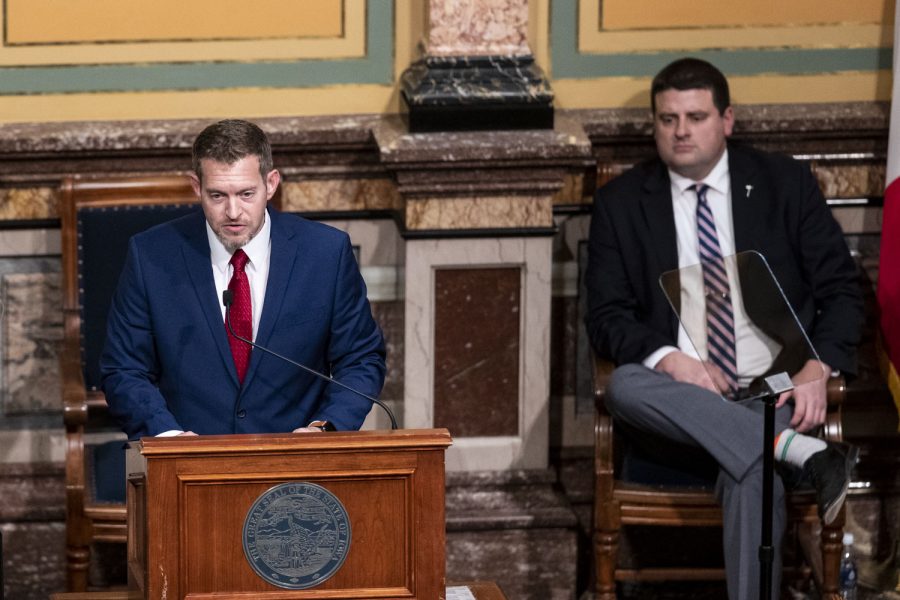Opinion | Stop banning books
People need to openly discuss books and not ban those with which they disagree.
Senate President Jake Chapman speaks before the Condition of the State address delivered by Iowa Governor Kim Reynolds at the Iowa State Capitol in Des Moines, Iowa, on Tuesday, Jan. 11, 2022. During the State address, Reynolds spoke about childcare, Iowa teachers, material taught in schools, unemployment, tax cuts, and more.
January 27, 2022
It’s no argument that books are great tools for education. However, with the recent movement to ban certain books, we need to better understand the value each book brings to education.
A new movement to ban certain books has spurred in red states. Some parents, politicians, and school board members want to ban books that include sex, LGBTQ+ characters and relationships, racism, and drugs.
In Iowa, Republican politicians have suggested teachers deserve jail time for books that are considered too graphic. Recently, Iowa Gov. Kim Reynolds pushed for more transparency in what books are offered and read.
People behind the movement believe the books portray content that is inappropriate for children, but most of the books being targeted present important, if sometimes heavy topics in age-appropriate ways.
Keeping these books on the shelves allows students to understand and learn about the diversity and history that exist around them.
One book banned is Toni Morrison’s Beloved, because of its use of racial slurs and content about slavery.
It is understandable to be upset on either side of learning about slavery, i.e., feeling uncomfortable to learn your ancestors were a lot closer to villains when they enslaved people or feeling uncomfortable to learn your ancestors were enslaved.
But the discomfort felt from learning about these things is instructive, and can be an important educational tool for people to decide what our society should do next.
While conservatives are the ones making a full-court press against books by LGBTQ+ authors and people of color, liberals have not been blameless in banning books either. Neither side should ban books, as learning all sides of an argument is important when coexisting with each other.
A book that has been frequently challenged is The Adventures of Huckleberry Finn has been frequently challenged, even in blue states like New Jersey. From 2000 to 2009, Huckleberry Finn was the 14th book most requested to be banned, for excessive use of racial slurs and its inherent racism.
There are some who say we can’t ban books when it’s conservatives banning LGBTQ+ books, but when it comes to old “classics” like Huckleberry Finn and Gone With the Wind because of their unwarranted use of slavery and racism, people turn a blind eye.
We need to realize that all books could provide education and discussion around our history.
One takeaway is that the main people encouraging the ban on these books are parents. These parents are scared, not knowing how their kid is going to react to these books, so they choose to ban them.
However, schools can be the frontrunner for true education by allowing students, parents, and teachers to communicate with one another on the books being read, why they are important, and what these topics mean or don’t mean.
That is what this comes down to. People, whether teachers or parents, need to talk to their kids about these books. Topics may delve into sensitive issues such as racism or slavery, but we can still learn and have discussions about what it’s trying to teach us.
Columns reflect the opinions of the authors and are not necessarily those of the Editorial Board, The Daily Iowan, or other organizations in which the author may be involved.



